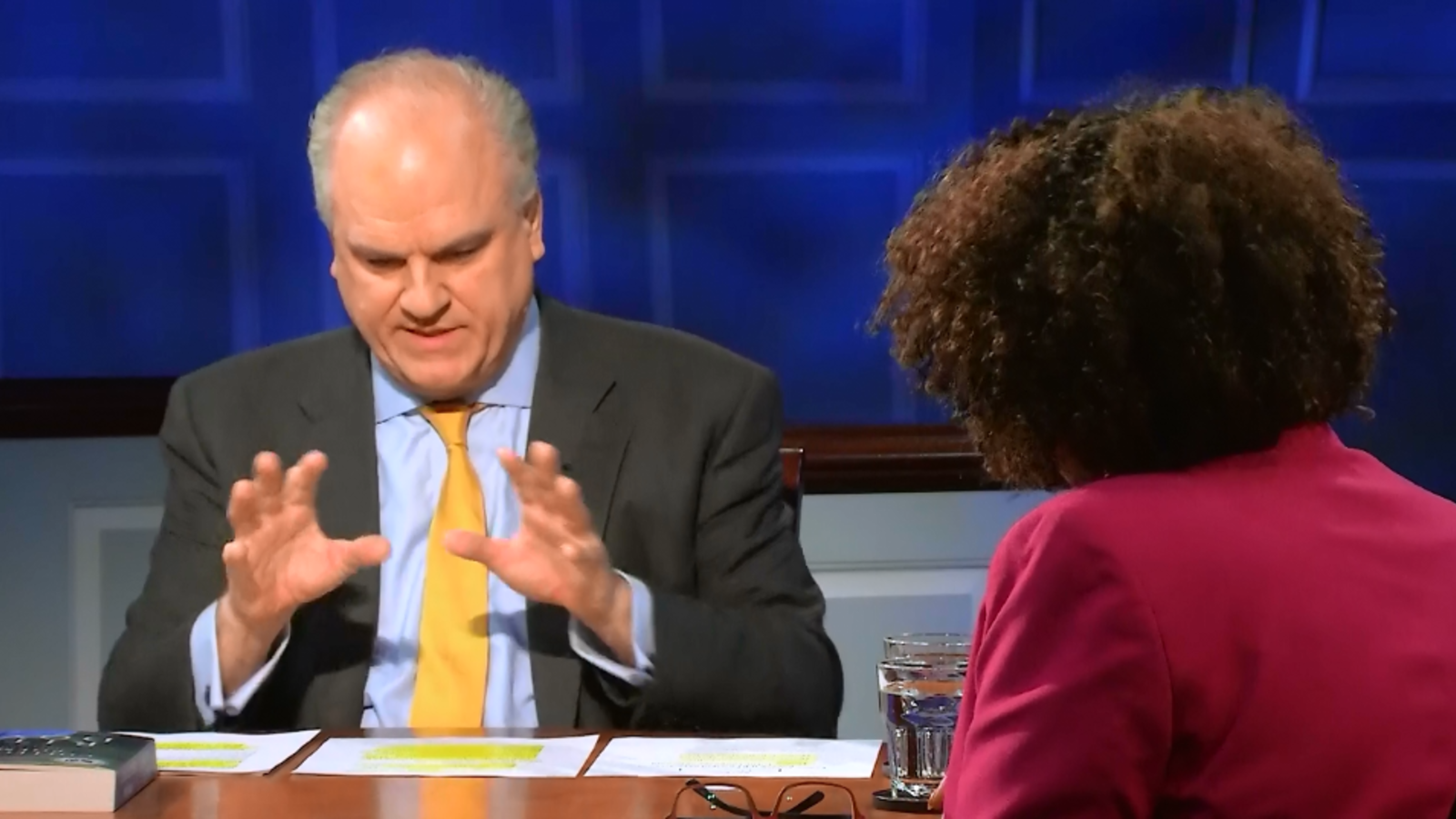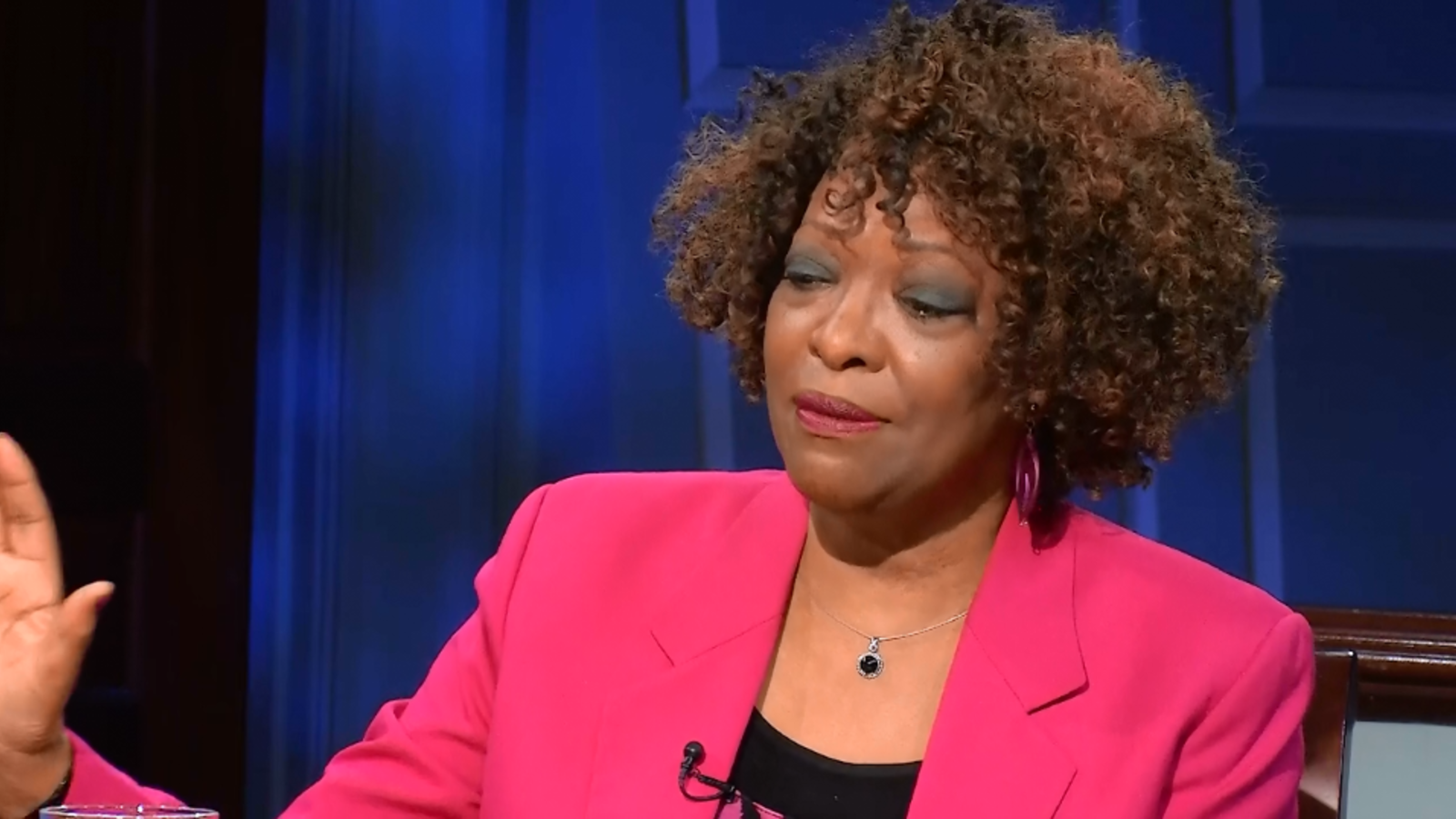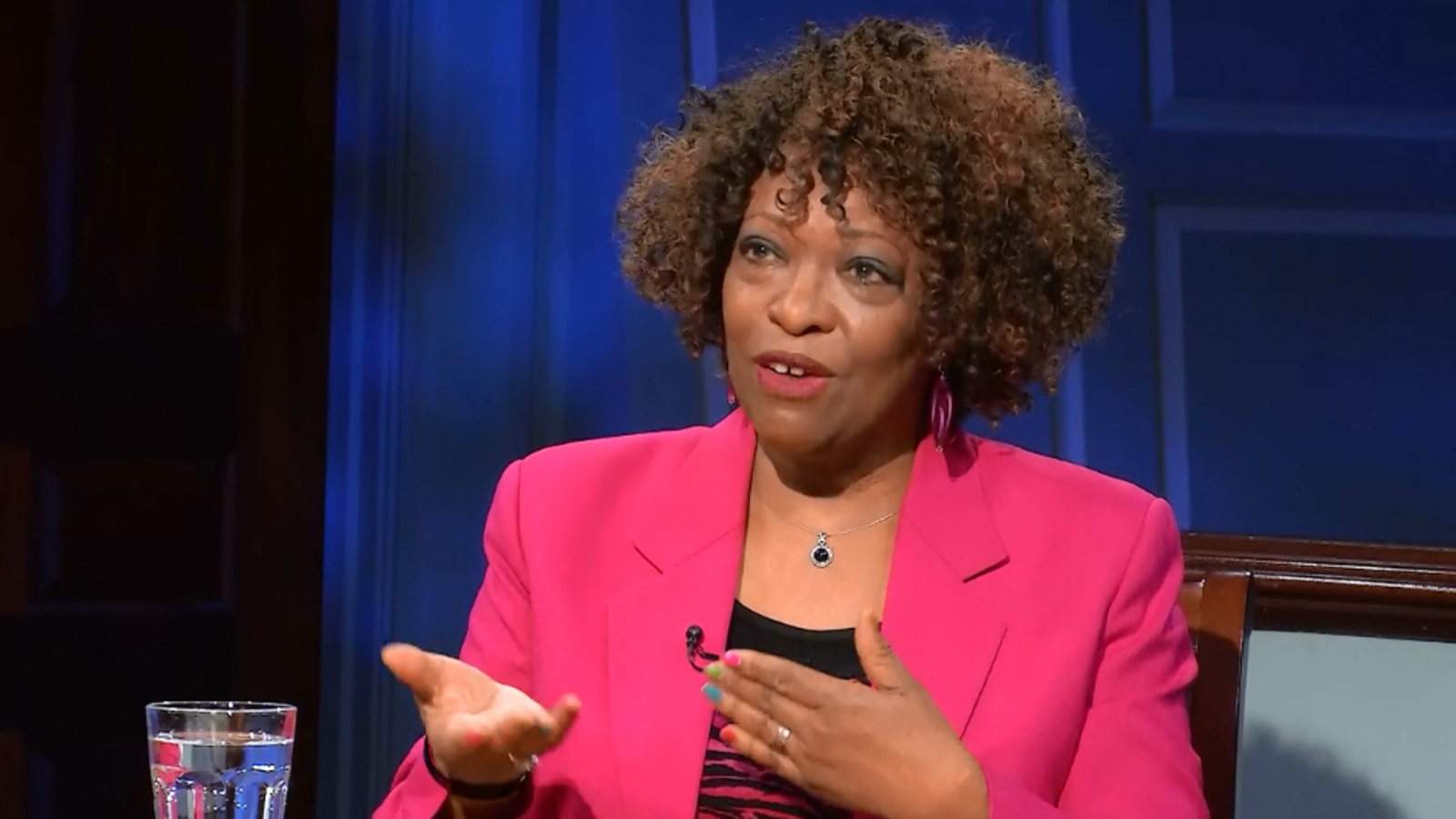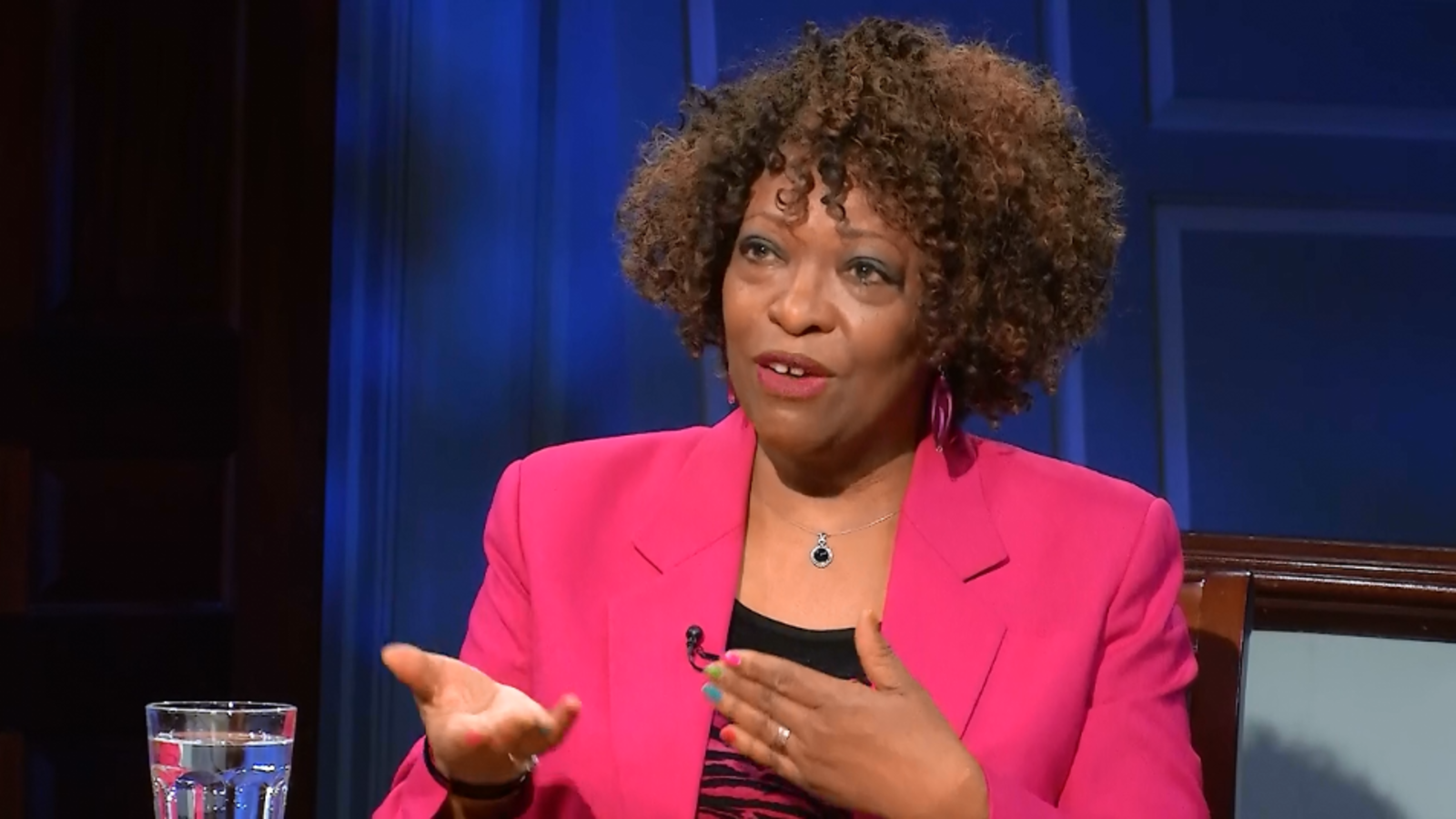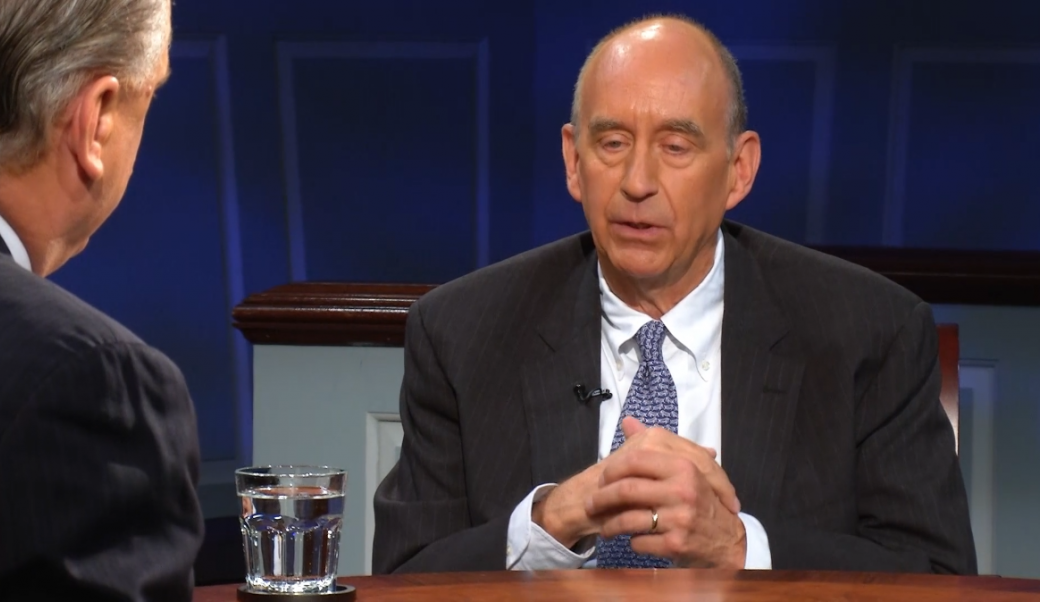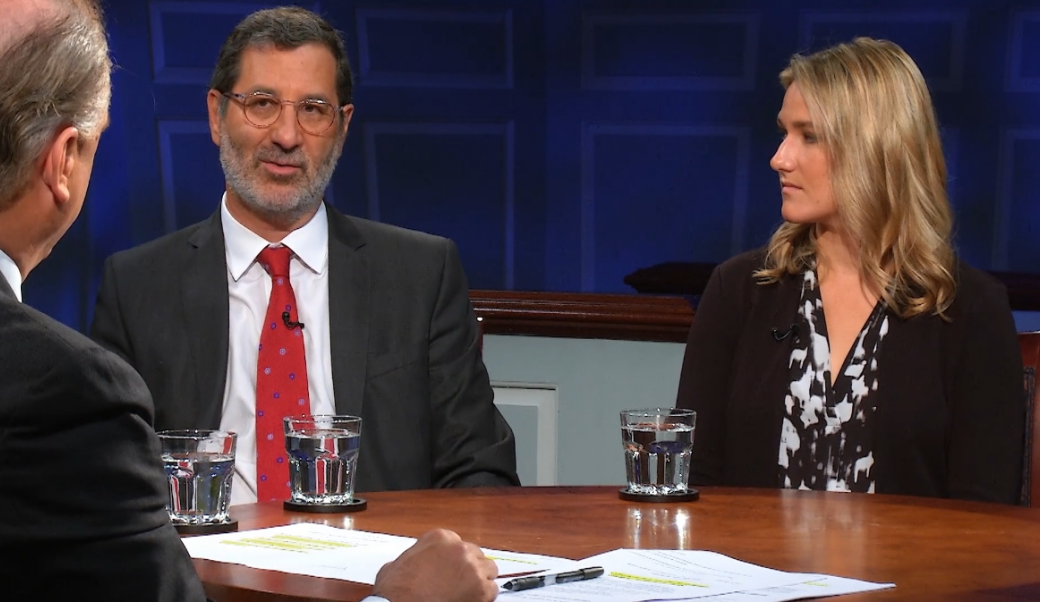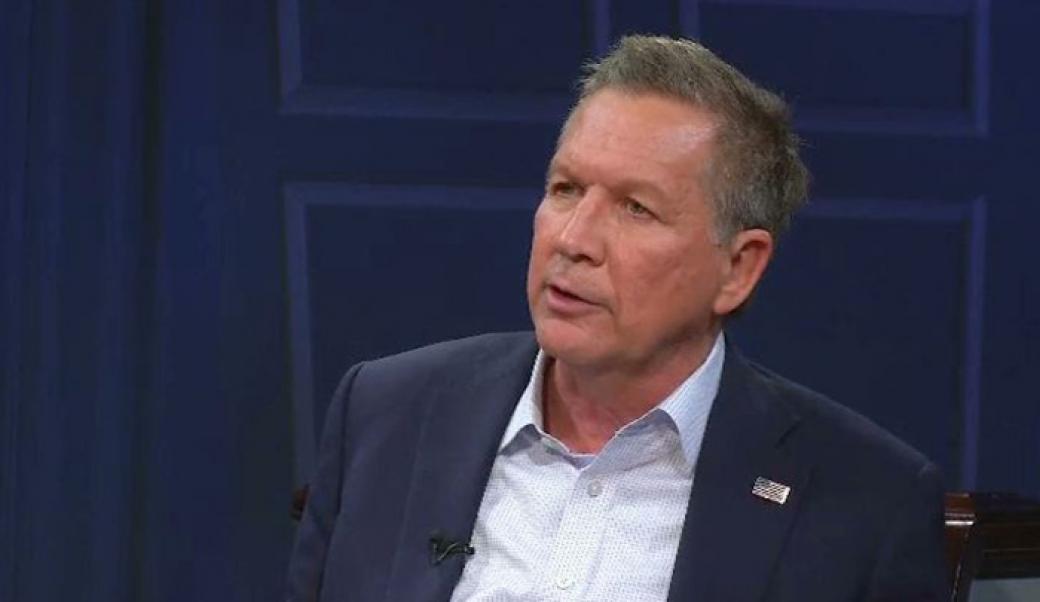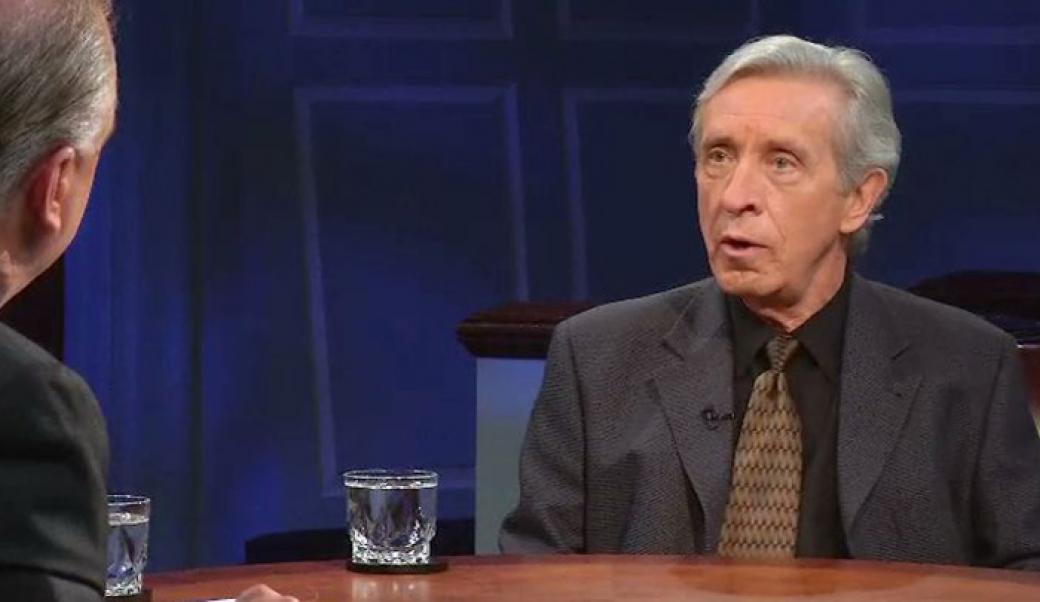About this episode
February 21, 2018
Rita Dove
Hosted by Douglas Blackmon
In this week’s episode of American Forum, we’re joined by RITA DOVE, the former US Poet Laureate, appointed by President Bill Clinton in 1993. She joins us not for the kind of political analysis we do so much of around here, but for a conversation about language and leadership—about the ways that societies are bound by words, and why it may be that all presidents need poetry more than they might imagine.
The Presidency
Why Presidents Need Poetry
Transcript
Doug Blackmon: Welcome back to American Forum. I’m Doug Blackmon. We have a very special guest in this episode of American Forum. She’s not a presidential candidate or a US senator or a representative. She’s not an historian who obsesses about dead presidents or a journalist writing maniacally about living ones. Instead, our guest is a preeminent observer and voice of the American experience, its aspirations, and the persistent dilemmas and contradictions that have always wrestled within it. Rita Dove is the former Poet Laureate of the United States, appointed by President Bill Clinton in 1993. She won a Pulitzer Prize for Poetry in 1987, was awarded the National Humanities Medal in 1996 and the National Medal of Arts, awarded to her by President Obama in 2011. She currently teaches poetry and continues to write it here at the University of Virginia. Rita Dove was also among a group of prestigious American writers who staged a protest of President Donald Trump’s election shortly before he took office, and she was a critic of the president’s decision not to include a reading of poetry in his inauguration ceremony. She’s joining us today not for the kind of political analysis we do so much of here but for a conversation about language and leadership, about the ways that societies are bound together by our lyrics and words, and why it may be that all presidents really need poetry more than they might imagine.
Whether one admires or despises our current president, most all would all agree that Donald Trump hasn’t appeared particularly poetic. (laughter) But in his often pained relationship with language, it’s more complicated than that. His supporters see and hear a wealthy tycoon who descended from his golden tower, rolled up his sleeves, cast aside political correctness, and spoke to the hearts of millions of regular Americans, citizens who in recent years increasingly felt, whether justified or not, that the rhythms of their nation were changing in ways they could no longer understand or bear. For millions of other Americans, the language of President Trump has been simply vulgar, coarse, and mocking, as far from the melody of America as they could imagine. So, for at least a few minutes in this troubled time of division and bitter words, let’s talk about poetry. Rita, thank you for being here.
Rita Dove: Great to be here, Doug.
3:01 Blackmon: So you gave an interview that I think was published in Salon, uh, around the time of the election or shortly after, but there was a line from it that I picked up on where you said, “The first thing that goes when a government becomes a tyranny are words.”
Dove: Yes.
3:16 Blackmon: What did you really mean by that?
Dove: Well, I think, first of all we can see that—that whenever there’s a—a coup or a revolution, they shut—try to shut down the press. They try to shut down the media towers. They try to shut down communication. That’s on the—the very big level. You want to keep people from talking to one another and from organizing and resisting, but on a—on a deeper and more subtle level, uh, there is the sense that if you can control the language that is being used, in a certain way you also control how the message is being deployed.
FACTOID: Turkey, China, and Egypt Responsible for 51% of journalists jailed in 2017
And so one of the first things that happens is that the poets, the artists, the writers are often silenced in oppressive regimes. I think what happens in our, quote-unquote, “democratic” society, in our permissive society, is that, um, whoever can control, as you said, the rhythm of the way in which we hear things, it has a good chance of also orchestrating people’s responses.
4:24 Blackmon: So when you were part of this—this, uh, organized protest of writers, uh, at—on the steps of the New York Public Library, right?
Dove: Yes, it was.
Blackmon: Yeah, at the—um, just before the inauguration, but so—I mean, there were a lot of people who were unhappy about the outcome of the election and a lot of people who were happy about, you know—
FACTOID: Hundreds joined writers resist protests worldwide January 15, 2017
Dove: Mm-hmm. Mm-hmm.
4:40 Blackmon: —so, uh, grant that. But the—but what was it—in terms of people who were displeased by the outcome, what was the message of that gathering of writers that was distinct? You know, what—what was the special message of the writers apart from just the general unhappiness of those whose candidate had not won?
Dove: I think on one level what—what we wanted to do—and this was—this was organized by the PEN America Center, which is a center which is actually international, poets, essayists, novelists—PEN—and most PEN centers also, uh, work to free writers who are imprisoned or are being oppressed by various regimes.
FACTOID: PEN montiors 700-900 cases of writers persecuted each year
What the American PEN Center wanted to do—we wanted to do what’s—first of all, let people know that writers are also citizens, and these particular writers were protesting the fact that—that they felt that we needed to speak up, that our government was—we were not pleased with the way things were going. On the—on—in very distinct terms, yes, there was also the sense that this was a—a president who had already shown—or president-elect—who had already shown that he was not a friend of the arts, of any of the arts. And to my mind and, I think, to many people’s minds, the arts are really the—the signature of a civilization. What we did at the—at the, uh, protest was to inject, in fact, literature into it because, uh, rather than just chanting we tried to reclaim the language. And so each of us who spoke was asked not to speak polemically but to read a poem or an excerpt from some lang—some literature that we thought spoke to that moment.
6:35 Blackmon: And you read your poem “Lady Freedom Among Us,” which you had—
Dove: I did.
Blackmon: —originally read at the bicentennial celebration of the—the setting of—the bicentennial of the setting of the cornerstone of the U.S. Capitol, right?
Dove: Yes, that is right.
Blackmon: Yes.
Dove: And—and at that time, when I read that poem the first time at the—at the, uh, bicentennial of the U.S. Capitol, uh, it was—it—it was a kind of reminder, and the poem is about, uh, you know, looking at Lady Freedom and not thinking of her as a—as a homeless person.
FACTOID: 15,000 pound statue of freedom has topped the Capitol since 1863
She’s part of our—of our lives, the fabric of our lives. It—it felt regrettable that nothing had changed or had gotten, in fact, worse, and so I—that’s why I read that poem, but I also read a poem by Marge Piercy, um, who was a wonderful poet and had written this poem many, many decades before that in which she talks about the helplessness of a writer in the face of times which are moving very quickly and which seem to—what can one poet, one writer, one person do, and, uh, which also seemed somehow timeless. I wanted to draw that connection.
7:46 Blackmon: Yeah, and the—and a parti—a line from “Lady Freedom Among Us,” uh, referring to her, “She who has brought mercy back into the streets / and will not retire politely to the potter’s field,” just that one line—
Dove: Yes.
Blackmon: —“will not retire politely,” I mean, I guess you were saying—you weren’t—you’re not going to retire politely.
Dove: No. Not going to—not going to do that. (laughter) Well, one thing I—you know, when I became Poet Laureate, and—and, granted, as a poet up to that point I felt like the best thing I could do in the world is to write my poems and—and lead that life of a poet, and to be called to the stage, so to speak, to be called, uh, to the world and to say, you know, “Are you going to say something for the entire American people?” was a terrifying notion. On the other hand, I got so many letters from people who were writing who were not poets, who were not professors, who were—but—but came from all walks of life, and kids, and who talked about the importance of poetry in their lives, immigrants who said, “The first book I read was a book of poems, and it made me want to learn this language,” for instance, or—or lawyers who—who said that, “I study law, and therefore I know what language can do and how powerful it is.” And these things convinced me that—that I needed to be open to the—to the American people. I needed to be kind of a lightning rod for these kinds of concerns.
FACTOID: Fewer than 7% of Americans read poetry in 2012, down 10% from 1992
And because of that, when I was Poet Laureate, every time they asked me to say a few words, which is, you know, a euphemism for “Do you have a poem?” uh, there’s always a poem for every occasion. Uh, there’s always something that’s been written because poets don’t just write about flowers, (laughter) you know, and—and love, though love is pretty all-encompassing. But poets write about life, and they give us—I think all—all poets, I mean, every poet that I’ve ever known who wanted truly to dedicate themselves to this—to this, you know, passion and this occupation, they want to express the—the desires of the soul in a way that will connect to another person. It’s all about communication, using language in a way that sings.
10:14 Blackmon: Well, so I said before in the—in the introduction that, uh—that President Trump is not poetic. Whether—whether you like him or not, he—one would not typically describe him as being poetic, but, uh—but he is very effective with language. He’s a very powerful user of language, uh, and the—he’s not like—like President Bush, W., um, you know, kind of struggled with—with words, and, you know, a super smart guy, you know, but he just wasn’t much of an articulate, uh, and expressive man. And so he would—he would stumble over words, and it would be an embarrassment to him and, you know, kind of Saturday Night Live jokes and all that. Uh, President Trump is not that at all. You know, he—he’s not a—you wouldn’t say he’s a sophisticated speaker, uh, in the sense of a Barack Obama or any number of other presidents.
Dove: Mm-hmm. Mm-hmm.
Blackmon: But—but he is a very powerful speaker. So, having said that, I want to see if you can recognize, uh—if you can identify the poet in what I’m about to read to you? So who—who actually might have written this poem? (laughter) “We are trying to fight ISIS, and now our own people are killing our police. Our country is divided and out of control. The world is watching.”
Dove: Hmm.
11:24 Blackmon: That’s Donald Trump.
Dove: Yeah. Makes sense.
Blackmon: That’s a tweet from Donald Trump, July 17th, 2016.
Dove: Makes sense. He’s very—I mean, I would never be someone who would belittle the fact—his use of language. I mean, that’s what got us into this dilemma in the first place, laughing at him instead of watching very carefully how he—how he can control, uh, one’s mindset. But—but he uses language very deliberately. He does not have, it seems, a great vocabulary.
FACTOID: Trump: “I know the best words, but there’s no better word than stupid.”
I don’t know if really does or not, but he’s not using a great vocabulary. But he also insists on that, and that’s—so he—he actually just keeps battering at the same group of words until that’s all that is permitted to be used. So now he’s narrowed the field in terms of what words you can use to express anything, and then he redefines things, and that’s all done very masterfully. And it behooves us to try to think of ways to, uh—to counter that, if you wa—if you will.
12:29 Blackmon: All right. I’ve got to—I’ve got to read one more to you.
Dove: Oh, please. (laughter) You’re hurting my soul.
12:30 Blackmon: I’ve got to read one more to you. This would—this would suggest, uh, a slightly different aptitude, uh, and that would be for children’s poetry. Uh, this is—this is, uh, from November of 2017. “Why would Kim Jong-un insult me by calling me old when I would never call him ‘short and fat’?”
Dove: Oh, God.
FACTOID: North Korea tested 23 missiles in 2017, including its first ICBM
12:59 Blackmon: “Oh, well. I try so hard to be his friend, and maybe someday that will happen.”
Dove: Oh, gosh. (laughter) Oh, gosh.
Blackmon: [inaudible].
Dove: It’s like Dr. Seuss meets I don’t know what. You know, it’s—it’s—when—when tweets first came out, I remember thinking, “This could be a new medium for poetry.” It’s not the one I would choose, but the whole idea of this limited amount of space that can be very intimate, seems like it’s of the moment, but it does go out to many people, would be a wonderful thing for someone younger than me to—to start doing. I really did think that that would happen, and there have been some books, you know, of poetry composed entirely of tweets, and—and now tweets have been taken from us. (laughter) No, no, but he uses it very effectively. I mean, this is exactly a sort of prescribed amount of—of a period of concentration, and the Japanese haiku and the tankas and all of them also work on that premise that you have a very limited amount of time in which to do something. It is a crystallized moment, and yet, with tweets, you can forgive any kind of aberrations because it supposedly happens off the cuff.
14:16 Blackmon: Yeah, it’s—it really—I mean, that’s what my—you know, I’m not a poet, but—but, uh, the—the art of writing, you know—so much in it is about reduction, you know, and just—and more. It’s almost as if, you know—I used to tell reporters who worked for me—I’d say, you know, “The truth is everything you bring in can be shorter even after we shorten it.” And the—now, you do get to a point of diminishing return on that when you get down to the last few words, but the, uh—but the notion that—I really am—I—I bring those tweets up from the president really not to make fun of but to—but to express some awe that—at the effectiveness of it and how, uh, in a—in a kind of organic way the discipline of that form, uh, has something that he felt and captured and has used so effectively.
Dove: Yes.
Blackmon: It’s—it’s really remarkable.
15:14 Dove: Yes. And what we need now is a poet of tweets to do some counter-tweets, you know, to start putting them out there. This is not my thing. (laughs)
Blackmon: I looked—we looked up—we looked up your twitter handle, and you do have one, I think, if it actually is you.
Dove: No, it isn’t.
Blackmon: Oh, but—OK, but it has—(laughter) well, it—it looks like you because it was reasonable stuff. But the—
Dove: Oh, gosh. No.
Blackmon: —but the last tweet—but the last tweet was four years ago, and so—
Dove: OK.
15:30 Blackmon: —we thought, “OK, she’s not doing it anymore if that’s really her. You have a little bit of a—on the one hand, when you’re telling your story, uh, in one respect you have a con—the conventional background of an African American woman, uh, with roots in the South and, you know, the poems you were describing earlier of a family that lived the classic black American Southern experience. But then, your story is not conventional, um, where, you know, you—you end up, uh, in Germany, and you—you know, you see the world in a—in other ways. You live away from the United States. You come back to the United States, um, marry a German man, I believe. The, uh—how did that affect—this is my Oprah question, uh, but it relates to other things. But—but how was it that all of that—what difference did that make, uh, in terms of how you saw America and how you then versed America?
Dove: Huh, yes, it’s—well, like anything, it’s complicated. Um, I grew up as a kind of first-generation, uh—or second-generation, I guess, you know, middle-class kid in the sense that my—my parents were not middle class, but they became middle class. And they, in fact, hid things from me. I didn’t realize that my father, though my father had a chemistry degree, I always knew him as a research chemist with Goodyear Tire and Rubber. I didn’t know that he had run the elevator for years, uh, at Goodyear and ferried, in fact, his classmates, his former classmates, up and down until finally, um, some of those classmates and one of his old professors prevailed upon the, uh—you know, the supervisors to give this black guy a chance. And I didn’t know that until I was in—in college, and I asked him why, “Why didn’t you tell me?” He said, “I didn’t want you to be bitter.” He says, “I wanted you to think—you know, I wanted to give you as much confidence as you could have before this stuff hit you.” And, uh, so that was one thing that gave me a different level.
Then, it’s true that, because of things like that, little things, to me, perhaps, but great sacrifices that they made, when I, uh, decided to go to Germany—I got a Fulbright to Germany, and I thought, “OK, why not? Let’s go,” instead of thinking, “Oh, no, they’re going to hate me,” and blah, blah, blah. When I got to Europe and I realized—I—I went to Europe. It was in the ’70s. It was right around the time of Chile, Allende, all this, Vietnam War. Uh, I saw how other people were looking at America, and I realized that the news that I thought was completely free and open in the United States was in fact not quite that way, that I was not getting the entire picture.
FACTOID: Allende: Marxist president of Chile ousted by CIA-backed coup in 1973
I had—I did not realize that there were other views, and I began to read more widely the news. And when I realized that, that—that I had blinders, I thought I was a really good liberal person, you know, and then I realized that I didn’t even know the whole story of anything. I thought I knew. That was profound and made me, uh, also feel much more sympathetic toward people who seemed blindered in some way, because I realized sometimes you don’t even know, uh, what you aren’t seeing.
18:55 Blackmon: Um, uh, you were, uh—you were interviewed, uh, by, I think, the New York Times and the Washington Post. And, uh, there’s a line from a—the story, “When asked whether she might have an impact in this city,” meaning Washington, DC, “with its large black population, she said by telephone from her home in Charlottesville, Virginia, ‘It’s exciting to think about what I can do to make a difference in the Washington area and throughout the country.’” How do you feel about—25 years later, you know, did you accomplish things that you hoped? Do you think the country has, uh—ha—has accomplished what you then thought might be possible?
Dove: Ah. Well, in terms of poetry, there are so many wonderful things that have happened since, and I hope that I helped to contribute that—to that. I think that many, many more, uh, people are open to the idea of poetry. Poetry has entered into the national conversation in a way that’s not terrifying, uh, and that’s good, because I do think that there was—there’s a—a great fear that people have about poetry that they aren’t going to understand it. And my feeling on that is that, well, it’s because poe—poems are made of words, and you feel that, to show that you can understand it, you have to explain it with words. But if the poet has used the best words, you’re obviously, you know, going to have trouble explaining it. That’s one of the problems, whereas we have no problem talking about, you know, movies that move us or—or sports figures that we think are great because that’s a different medium. But that’s another thing. So I—I do think there are—the number of women who are writing poems today who have—who are recognized, who have been published has increased so much. African American poets, uh, poets from the South, poets—Asian American poets, Hispanic poets, and the fact that people feel comfortable with talking about where they are from, that no matter how, quote-unquote, “small” of a population it is and having the faith that that will, like, strike a chord with the rest of the country, that sense of American poetry has expanded.
FACTOID: Current poet laureate, Tracy Smith, to hold poetry events in rural areas
So I’m hoping that I had something to do with that. I think I did, but I think there are also lots of other people who came after me who also did that, so—yeah.
21:17 Blackmon: Well, read something for us, if you’d like.
Dove: OK. Sure. I’m going to read a poem, which I read, um, back in October here at the University of Virginia for the, um—the bicentennial celebration, um, mainly because I thought that it would, um—it kind of solidifies our talk about history and how history works in terms of poetry, what can poetry do in order to—to, um, illuminate that aspect, a different aspect of history. This poem was written in the—the voice of Henry Martin, who was the bellringer here at the University of Virginia. He was, uh, born on the day that Thomas Jefferson died. We live steeped in history here in all of its contradictions. He was, uh, then, obviously, born into slavery and then became the bellringer here at the university.
FACTOID: Martin born July 4, 1826, the day Jefferson and John Adams died
He kept everybody’s time, and, uh, so here it goes, “Bellringer.” And there is a quote from Henry Martin, one of the few, “I am as true to that bell as to my God. I was given a name. It came out of a book. I don’t know which. I’ve been told the great man could recite every title in order on its shelf. Well, I was born, and that’s a good thing, although I arrived on the day of his passing, a day on which our country fell into mourning. This I heard over and over from professors to farmers, even duel-scarred students, sometimes in grand company remarked upon in third person, a pretty way of saying, ‘More than two men in the room means the third can be ignored,’ as I was when they spoke of my birth and Mr. Jefferson’s death in one breath, voices dusted with wonderment, faint sunlight quivering on a hidden breeze. I listen in on the lectures whenever I can, holding still until I disappear beyond third person. And what I hear sounds right enough. It eases my mind. I know my appearance frightened some of the boys, the high cheeks and freckles and not-quite-Negro eyes flaring gray as storm-washed skies back home. It shames them to be reminded. So much for book learning. I nod as if to say, ‘Uncle Henry at your service,’ then continue on my way through darkness to start the day. This is my place, stone rookery perched above the citadels of knowledge, alone with the bats and my bell, keeping time. Up here, molten glory brims until my head is rinsed clear. I am no longer a dreadful coincidence nor a debt crossed off in a dead man’s ledger. I am not summoned, dismissed. I am the clock’s keeper. I ring in their ears, and every hour down in that shining, blistered republic someone will pause to whisper, ‘Henry.’ And for a moment, my name flies free.”
Blackmon: Wow. Rita Dove, thank you so much.
Dove: My pleasure.
24:55 Blackmon: What do you think about the language of President Donald Trump or the many facets of poetry in our society? Does it help you make sense of the world? Have we inspired you to read some verse? Let me know via the email on your screen or on Twitter, @douglasblackmon, or perhaps instead of writing me follow the advice of the great American writer E. E. Cummings, who once said, “Write poetry, for God’s sake. It’s the only thing that matters.” (laughter) One last thing, this program is coming to an end soon, so be sure to tune in for American Forum’s upcoming final two episodes before we are off the air for good. We’ll be sitting down next with former New Jersey Governor Chris Christie, and then, in our last broadcast, with historian Will Hitchcock for a conversation about President Dwight Eisenhower and what it used to mean to be a great American Republican. See you next week. (applause)
